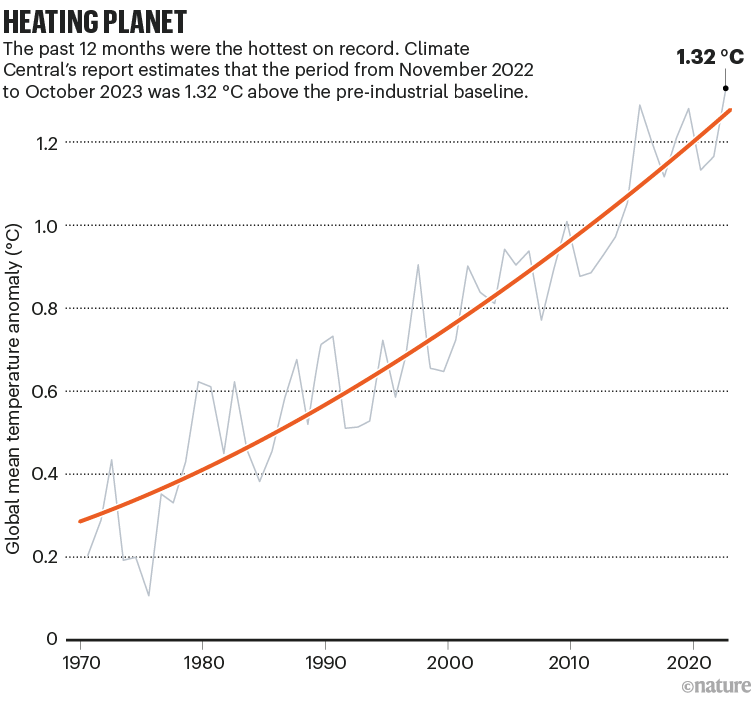Hello Nature readers, would you like to get this Briefing in your inbox free every day? Sign up here.

Extreme-heat events affected places including Texas in the past year.Credit: Brandon Bell/Getty
Over the past 12 months, the average global temperature was 1.32 ℃ above the pre-industrial baseline, and one-quarter of people experienced dangerous levels of extreme heat, according to a report by the non-profit organization Climate Central. The European Union’s Copernicus Climate Change Service predicts that 2023 will be the warmest calendar year on record. “This is the hottest temperature that our planet has experienced in something like 125,000 years,” says climate scientist Andrew Pershing, vice-president for science at Climate Central. Most of this warming, about 1.28 ℃, is the product of human impacts. Natural variations caused by processes such as the ongoing ocean-warming event El Niño contributed much less, says climate researcher Friederike Otto.
Nature | 5 min read
Reference: Climate Central report & Copernicus Climate Change Service bulletin

Source: Climate Central
Scientists have created an infant ‘chimeric’ monkey by injecting a monkey embryo with stem cells from a genetically distinct donor embryo. The resulting animal is the first live-born chimeric primate to have a high proportion of cells originating from donor stem cells. The monkey’s creation paves the way for scientists to use chimeric primates to study human diseases. But the monkey had to be euthanized when it was only ten days old because of hypothermia and breathing difficulties, highlighting the need for further optimization of the approach and raising ethical concerns.
Nature | 4 min read
Reference: Cell paper
More than a dozen researchers have resigned from the United Kingdom’s national funder, UK Research and Innovation (UKRI), after it dissolved its equality, diversity and inclusion (EDI) advisory group in response to a government minister’s demand. Science minister Michelle Donelan made the request because she was “outraged” at “extremist” views on the Israel–Hamas conflict expressed by two EDI-panel members on social media. Critics say the intervention violates principles of academic freedom and freedom of speech. “These tweets were not in any way ‘extremist’,” says historian Laura Kelly, one of more than 3,300 academics who signed an open letter urging the funder to reject the minister’s request. “They just happened to be, rightly, in my view, going against the UK government’s stance on this issue.”
Nature | 4 min read
Features & opinion
Table of Contents
Russian scientists tell Science that their hopes for the country were dashed with the rise of President Vladimir Putin. Some have left and worry about the early-career researchers and students left behind. Others who have stayed are contending with sanctions provoked by the country’s invasion of Ukraine and are subject to oppression if they speak out against the war. In some ways, the exodus is reminiscent of the period in which scientists migrated away from the Soviet Union — but there is a key difference, says sociologist Dmitry Rudenkin. “They were leaving for somewhere else, and now we are only running from Russia.”
Science | 13 min read
A surly ice-miner working out near Neptune meets the digital back-up of his distant Earth relative in the latest short story for Nature’s Futures series.
Nature | 6 min read
Amphotericin B is a drug used to treat life-threatening fungal infections — but it’s extremely toxic to kidneys, meaning it is mostly used as a drug of last resort. Researchers have unpicked the mechanism behind the drug’s toxicity, allowing them to modify it and reduce its side effects in human kidney cells. “When I was doing my own medical-school rotations, we used to call it Ampho-terrible, because its impact on the patients is so severe,” physician-scientist Martin Burke tells the Nature Podcast. “We’re excited that perhaps something out of this paper could be a starting point for developing new medicines that could be impactful in the clinic.”
Nature Podcast | 28 min listen
Subscribe to the Nature Podcast on Apple Podcasts, Google Podcasts or Spotify, or use the RSS feed.
